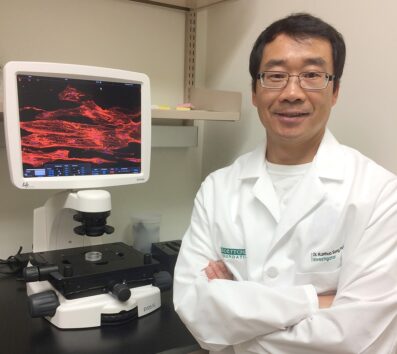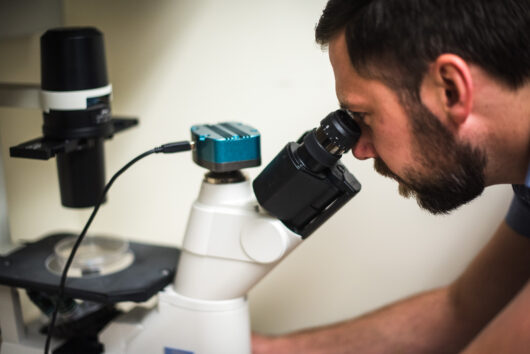
Scientists Discover Mechanism Affecting Heart Development in Down Syndrome
Research at the University of Colorado Anschutz Medical Campus discovers a molecular mechanism contributing to the development of heart malformations in infants with Down syndrome.
From Down Syndrome World Issue 2, 2023
Newborns with Down syndrome, a genetic condition resulting from an additional copy of chromosome 21 (trisomy 21), face a significantly increased likelihood of being born with congenital heart defects. Roughly half of all babies with Down syndrome are estimated to have some form of heart malformation, making Down syndrome the leading cause of congenital heart abnormalities. Despite numerous research endeavors spanning many years, the specific mechanisms through which trisomy 21 disrupts the normal development of the heart in the embryonic stage have remained elusive.
In a recent breakthrough, researchers at the University of Colorado Anschutz Medical Campus have uncovered a molecular mechanism that plays a role in the impaired development of the heart in individuals with Down syndrome. Led by Dr. Kunhua Song, a Linda Crnic Institute for Down Syndrome collaborator and an associate professor of medicine, the team conducted a series of experiments using both human cells with and without trisomy 21 and a mouse model of Down syndrome. These investigations shed light on the specific molecular factors contributing to the defective formation of the heart in Down syndrome.
By utilizing pluripotent stem cells sourced from participants in the Human Trisome ProjectTM, a comprehensive study spearheaded by the Linda Crnic Institute for Down syndrome at the University of Colorado, the research team took on the task of simulating the early stages of heart development, known as cardiogenesis, within a laboratory setting. During their investigation, they made a noteworthy observation: trisomy 21 hindered the process of cardiogenesis, and this malfunction appeared to be linked to an overactive cellular response to viral infections, specifically the interferon response. The team then proceeded to employ genetic and pharmacological techniques, successfully demonstrating that by blocking the interferon response, they could enhance cardiogenesis in the laboratory setting. This finding suggests a potential therapeutic avenue for improving heart development in individuals with Down syndrome.
“We were surprised to see strong activity of the interferon response during differentiation of pluripotent stem cells into heart muscle cells with trisomy 21. We now appreciate that an abnormally high interferon response could be detrimental to early heart development.”
— Dr. Kunhua Song, Crnic Institute Collaborator and Associate Professor
Dr. Song expressed his surprise at the robust activation of the interferon response during the differentiation of pluripotent stem cells into heart muscle cells with trisomy 21. The research team had not expected such heightened activity, and they now understand that an excessively elevated interferon response may have negative implications for the early stages of heart development. This discovery highlights the potential harmful effects of an abnormal interferon response on the proper formation of the heart in individuals with Down syndrome.
Continuing their inquiry, the researchers delved further into understanding how the hyperactive interferon response hindered cardiogenesis. Through their investigation, they made an additional breakthrough by uncovering that the interferon response actually impedes several crucial molecular processes necessary for proper heart development, including the Wnt signaling pathway. This finding sheds light on the specific mechanisms through which interferon hyperactivity disrupts the intricate series of molecular events essential for the formation of a healthy heart.

Per Dr. Congwu Li, primary author of the study, “Excessive interferon activity results in insufficient Wnt signaling, thereby compromising cardiac muscle cell performance. Unveiling this sequence of occurrences sheds light on possible approaches to mitigate abnormal heart development in Down syndrome by reducing interferon signaling and/or enhancing Wnt signaling.”
To assess the efficacy of this therapeutic approach in a Down syndrome mouse model, the researchers administered a JAK inhibitor—a medication that diminishes the interferon reaction—to pregnant female mice. They then observed the impact on heart development in the embryos possessing a genetic modification analogous to trisomy 21. Remarkably, treating the pregnant mice with the JAK inhibitor exhibited a significant enhancement in cardiogenesis among the mice.
“These findings hold great significance as they propose a prospective pharmacological approach for prenatal intervention in mitigating one of the severe consequences of trisomy 21. Infants born with Down syndrome and congenital heart anomalies encounter numerous hurdles, ranging from early postnatal cardiac surgeries to enduring physiological repercussions throughout their lives. Nevertheless, extensive further investigations are imperative to ascertain the safety and effectiveness of utilizing JAK inhibitors during pregnancy,” elucidates Dr. Joaquin Espinosa, co-author of the paper and executive director of the Linda Crnic Institute for Down syndrome.
Dr. Espinosa and his research team are presently at the forefront of clinical trials investigating the advantages of JAK inhibitors in older individuals, including children and adults, affected by Down syndrome.
These findings contribute to the expanding body of evidence highlighting the detrimental consequences of excessive interferon activity in Down syndrome, even in the initial phases of embryonic development. The outcomes further endorse the notion that several distinctive features of Down syndrome stem from persistent immune system dysregulation throughout life, and that reinstating immune equilibrium could yield therapeutic advantages.

“This collection of research serves as evidence of the remarkable scientific progress that can be achieved with adequate resource allocation and the enthusiastic participation of individuals with Down syndrome in research,”
— Dr. Joaquin Espinosa, Executive Director of the Linda Crnic Institute for Down Syndrome
“We are currently witnessing a genuine renaissance in the realm of Down syndrome research, propelled by substantial support from the National Institutes of Health INCLUDE Project, which represents the culmination of extensive advocacy by the Global Down Syndrome Foundation. Thanks to these concerted efforts, we hold a confident belief that individuals with Down syndrome will enjoy extended and healthier lifespans.”
Recent Posts
- GLOBAL LEADERS – An Exclusive Interview with Erin Suelmann, Executive Director of the Down Syndrome Association of Greater St. Louis
- Sleep Apnea Across the Lifespan in People with Down Syndrome
- Government Profiles: Robert Aderholt (R-AL) & Tammy Baldwin (D-WI)
- Connor Long & Josh Peck: A GLOBAL Bromance
- GLOBAL Launches Pilot Fitness Program using Mann Method PT

 Experience our inspirational and groundbreaking videos and photos. Our children and self-advocates are beautiful AND brilliant!
Experience our inspirational and groundbreaking videos and photos. Our children and self-advocates are beautiful AND brilliant! Make sure your local Representatives are on the Congressional Down Syndrome Task Force.
Make sure your local Representatives are on the Congressional Down Syndrome Task Force.